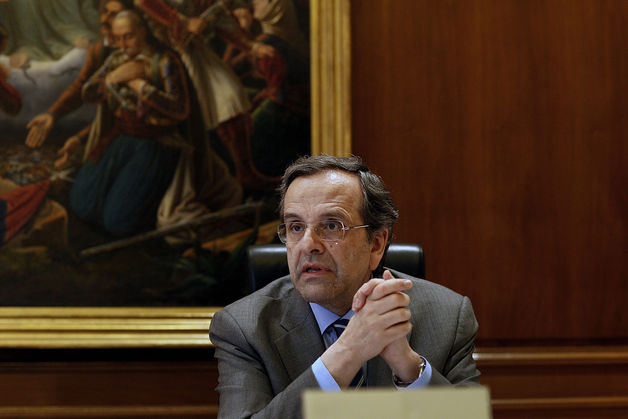
Moldova’s last chance for reform
December 9, 2014
European fans group slams Spain over ‘ultras’ crackdown
December 10, 2014Greek stocks and bonds slumped after Prime Minister Antonis Samaras opted to bring forward the process of choosing a new head of state, risking parliamentary elections in Europe’s most indebted state as early as January.
Samaras today nominated Stavros Dimas, a 73-year-old former European Union commissioner, for the post. Voting will begin next week, on Dec. 17, with two further rounds possible. Samaras will have to rely on opposition votes to push through his pick for the mainly ceremonial post; without them, his government will fall.
“It is a high stakes gamble,” Holger Schmieding, chief economist at Berenberg Bank in London, said in an e-mailed note. “Snap parliamentary elections in January could then bring left-wing Syriza into power in Athens.”
The news triggered a sell off in the Greek stock market, with the benchmark Athens Stock Exchange Index falling 10.5 percent as of 1:45 p.m. local time. Yields on Greece’s three-year bonds rose 118 basis points to 7.6 percent.
Under Greece’s constitution, a supermajority of at least 180 lawmakers in the 300-seat chamber is needed to elect a successor to the incumbent, President Karolos Papoulias. The government has just 155 lawmakers at its disposal. Failure to install a candidate after three attempts would prompt the collapse of Samaras’s coalition and the dissolution of parliament.

Antonis Samaras, Greece’s Prime Minister. Close
Antonis Samaras, Greece’s Prime Minister.
Open
Photographer: Kostas Tsironis/Bloomberg
Antonis Samaras, Greece’s Prime Minister.
Crucial Months
“Political uncertainty must end now,” government spokeswoman Sofia Voultepsi said late yesterday in an e-mailed statement announcing the vote. The coming months are “crucial” for an agreement on a credit line to replace Greece’s bailout program and negotiations over the country’s debt, she said.
Only some of the 24 lawmakers not currently caucusing with any of the country’s political parties have said they may support the government’s candidate for the presidency. All opposition party leaders have said they’ll block any pick made by Samaras, meaning the government will have to count on a revolt from opposition lawmakers against their official party lines to secure the election of a new president.
“The math is very difficult for the government,” said Aristides Hatzis, an associate professor of law and economics at the University of Athens.
Anti-bailout group Syriza, which currently leads the government in opinion polls, welcomed the announcement, saying that Samaras’s coalition didn’t have the votes to secure its choice of president. Greece’s next general election isn’t due until 2016.
Bailout Exit
More than four-and-a-half years after Greece began receiving an international bailout in return for budget cuts and economic reforms, the government has vowed to exit the unpopular rescue program at the end of 2014. It envisages regular emergency loan disbursements being replaced with precautionary credit lines from the International Monetary Fund and the European Stability Mechanism that would come with fewer strings, and would only be used if Greek borrowing costs spike.
Samaras’s plan was announced as euro-area finance ministers meeting in Brussels yesterday said that agreement on Greece’s final bailout review, a condition for the extension of a credit line, is not possible by the end of this year. As a result, the current bailout will be extended by two months.
Averting Worst
“Syriza may find itself winning an election, with less than a month before the program expires and Greece is left without a financial backstop,” said George Pagoulatos, a professor of European politics and economy in Athens. “This could steepen the learning curve in order to avert the worst.”
Staff teams from the troika of officials representing the country’s lenders — the European Commission, the European Central Bank and the IMF — are due to return to Athens today. There, they will resume talks on the measures required to complete the review, paving the way for the disbursement of about 7 billion euros ($8.6 billion) in aid outstanding.
The review, which started in September, remains stalled, as the country’s creditors raise doubts about the projections of next year’s budget and ask Greece to adopt more budget savings to ensure that it meets its targets.
Stavros Dimas
Samaras’s pick for the presidency served as European Commissioner for Environment between 2004 and 2009. The New York-educated lawyer worked for the World Bank from 1970 to 1975 and was subsequently elected to the Greek Parliament 10 consecutive times between 1977 and 2004 for the New Democracy party now led by Samaras.
The government’s decision was “the right call,” Costas Panagopoulos, chief executive officer at Alco, an Athens-based polling company, said by phone. “The dilemma posed to lawmakers and the Greek people will enhance Greece’s position in the ongoing negotiation” with the troika of creditors. “With this move, the government limits the period of uncertainty which was damaging for the country,” he said.
Samaras “knows he has to establish political clarity,” Michael Fuchs, the deputy chairman of German Chancellor Angela Merkel’s party, said in an interview in Cologne.
It’s “a calculated risk taken by Samaras that’s actually a smart move,” said Fuchs, who said he spoke with Samaras yesterday by phone. “Its chances of paying off are more than fair. He knows what he’s doing.”
To contact the reporters on this story: Nikos Chrysoloras in Athens at nchrysoloras@bloomberg.net; Antonis Galanopoulos in Athens at agalanopoulo@bloomberg.net
To contact the editors responsible for this story: Alan Crawford at acrawford6@bloomberg.net; Vidya Root at vroot@bloomberg.net Zoe Schneeweiss




